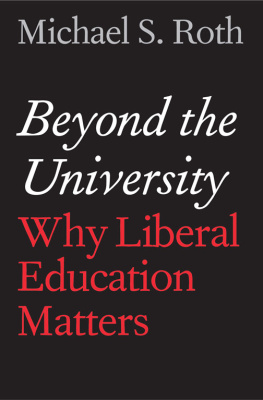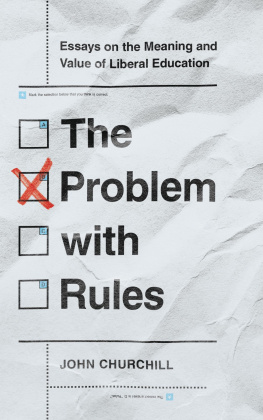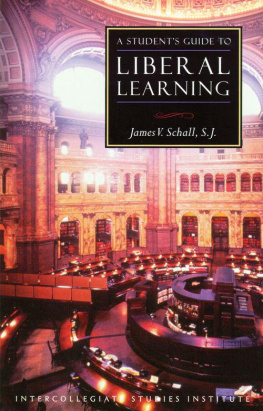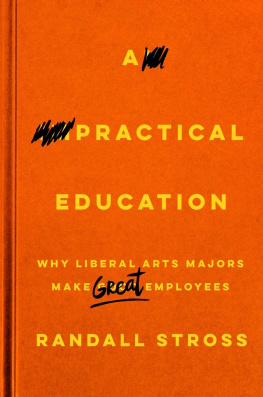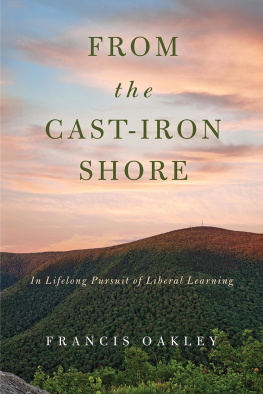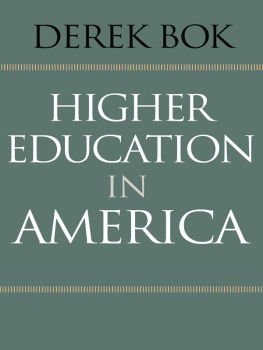

Published with assistance from the foundation established in memory of Calvin Chapin of the Class of 1788, Yale College.
Copyright 2014 by Michael S. Roth.
All rights reserved.
This book may not be reproduced, in whole or in part, including illustrations, in any form (beyond that copying permitted by Sections 107 and 108 of the U.S. Copyright Law and except by reviewers for the public press), without written permission from the publishers.
Yale University Press books may be purchased in quantity for educational, business, or promotional use. For information, please e-mail (U.K. office).
Set in Electra type by IDS Infotech, Ltd.
Printed in the United States of America.
Library of Congress Cataloging-in-Publishing Data
Roth, Michael S., 1957
Beyond the university : why liberal education matters / Michael S. Roth.
pages cm. Includes bibliographical references and index.
ISBN 978-0-300-17551-6 (hardback)
1. Education, Humanistic. 2. Education, HigherAims and objectives. 3. EducationPhilosophy. I. Title.
LC1011.R75 2014
370.11'2dc23
2013041084
A catalogue record for this book is available from the British Library.
This paper meets the requirements of ANSI/NISO Z39.481992
(Permanence of Paper).
10 9 8 7 6 5 4 3 2 1
For my teachers and my students
Contents

Acknowledgments

IN MY FIRST year as a college student, I often said I couldn't understand why somebody would study something just to teach it to somebody else. By the time I finished my undergraduate degree, I found that I enjoyed reading and research so much that I had a hard time imagining a future without further studies. My priority was to continue my education. I was very fortunate to have attended an extraordinarily intense yet open small university, Wesleyan, and then to go on to graduate work at Princeton. Both schools encouraged invigorating cultures of inquiry, and my teachers were very willing to let me follow my interests. I continued to wonder whether I should be studying philosophy, history, or psychology (I turned down a job in a psychiatric hospital to attend a Ph.D. program in history). My teachers basically said to stop worrying about what to call my field and to go to the classes that interested me while pursuing my research projects. I needed, they stressed, to continue my education. Eventually concluding that I was focused on how people make sense of the past, I did complete a Ph.D. in history. But my first book was on psychoanalysis (based on my senior thesis at Wesleyan) and my dissertation was on the history of philosophy. I was eventually a history and humanities professor before running a research program (and doing some curatorial work) at the Getty Research Institute for the History of Art. I went on to be president of California College of the Arts before returning to Wesleyan as president. It was good not to have to make up my mind. It still is.
I had remarkably gifted teachers at Wesleyan and Princetonteachers who provided guidance and inspiration, mixed with more than a little discipline and critique. I loved my teachers, but I didn't know that I would love teaching. Then, when given the opportunity to run discussion seminars in graduate school, I emerged giddy with excitement. I can't believe they pay us for this, I would exclaimto the chagrin of my fellow T.A.s, who pointed out how little they in fact paid us. I discovered that working with students on topics I cared about was going to be one of the joys of my life.
And what wonderful students I've had at Scripps College, Claremont Graduate University, California College of the Arts, and now back at Wesleyan! And in the last year I've had the dizzying and ultimately fulfilling experience of teaching online. My Coursera class is very different from the courses at the small institutions at which I've worked, but the energy of learning and the self-transformation that the students report have been stimulating and gratifying.
As a teacher, whether in the classroom or online, I devote much time to quoting texts. I want my classes to discover the joys of paying attention to the language, structure, and layered meanings in the books we read together. In this book, too, I provide more than the usual amount of quotations. I am hopeful that readers will get a feel for the compelling voices in the rich and varied American tradition of liberal education and that some will turn back to this tradition for further study (and pleasure).
I dedicate this book to my teachers and my students. They have allowed me to continue my education through more than three decades.

In the last few years, I have had several opportunities to try out some of the ideas expressed in this book with different audiences. I am grateful to the institutions at which I've lectured on liberal education and to the publications in which I've explored some of these ideas (Chronicle for Higher Education, Huffington Post, Inside Higher Ed, Los Angeles Times, New York Times, Wall Street Journal, Washington Post). My trustee, faculty, and administrative colleagues at Wesleyan have heard me out on the issues discussed in this book, and they have respondedoften quite vigorously. I am grateful for their patience, insights, and dedication.
The staff of the President's Office at Wesleyan has been enormously helpful to me throughout the time I've worked on this volume. Joan Adams, Marianne Calnen, Heather Brooke, and Lisa LaPlant have given me the time and space to write. Andy Tanaka has helped me oversee every sector of university operations so that I can also have the opportunity to turn to research and writing. These are great gifts.
The talented editor Ileene Smith and I first discussed this project when she was working with Yale University Press, and I am very grateful to her for her insights. Ileene introduced me to Georges Borchardt, who is now my agent. Georges's serene, intelligent responsiveness has helped keep this book on track. Steve Wasserman, who first gave me assignments (and advice) many years ago when he was at the Los Angeles Times Book Review, has seen the book through as an editor at Yale. I am grateful for his constructive input.
For many years now, Charles Salas has read my work with the intention of making it clearer, more accessible, and less prone to error. This has taken much time and effort. Although we agree there is more to be done, I want to express my deep thanks.
I've written this book sitting side by side with Kari Weil, my wife and colleague. While writing her own book (and essays, lectures, and student evaluations), she has suffered through my attempts to say something about psychoanalysis, history, photography, crafts, film, philosophy, and now education. Her critical acumen is exceeded only by her sweet, empathic energies, and I have been the lucky recipient of both. Without her, I'd never have gotten beyond the university.
Introduction

WHEN I BEGAN my freshman year at Wesleyan University almost forty years ago, I had only the vaguest notion of what a liberal education was. My father (like his father before him) was a furrier, and my mother sang with a big band before she decided to start a family. Giving their children access to a college education was part of their American dream, even if campuses sometimes seemed to them like foreign countries. Now I serve as president of the same institution at which they first dropped me off, and where I stumbled into courses like Intro to Philosophy and Abnormal Psychology. Much has changed in higher education since my student days. At highly selective schools, many undergraduates now behave like consumers, arriving on campuses with specific demands and detailed plans for their eight semesters. Many are intent on building rsums by choosing to double-major and accumulate credentials to match what they imagine to be an employer's expectations. Parents check that the facilities of the institution meet their standards of comfort and sophistication and want to be reassured that their student will develop specific skills that will justify the extraordinary financial investment that many private colleges and universities require. At large public institutions, declining state support has led to massive overcrowding, faculty who are underpaid and often part-time, and a creeping culture of pessimism about the quality of undergraduate learning. Students often enter the university system without the preparation to complete college-level classes, and professors are caught between maintaining standards and meeting the needs of undergraduates whose reading and math skills are woefully inadequate. A vast number of students drop out within the first two years, and those who persevere often have trouble completing their degrees because of the limited number of open seats in required classes.
Next page
